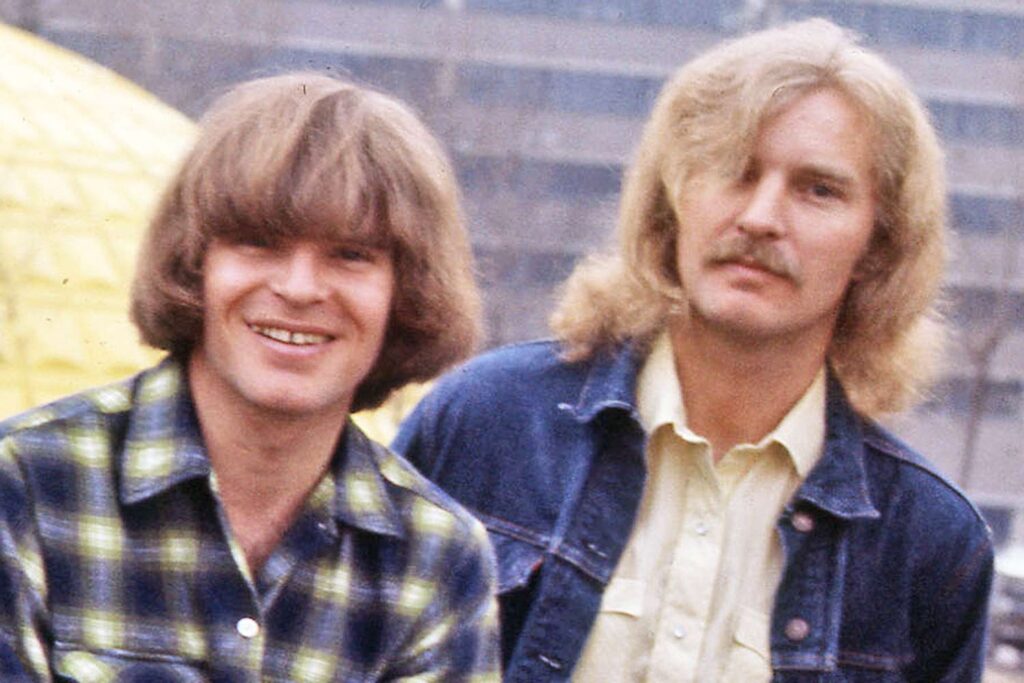NEED TO KNOW
His new album Legacy (out Aug. 22) re-records those classics with his sons, transforming once-painful memories into a joyful family project
The process also helped him reconcile lingering feelings toward his brother Tom, offering a sense of emotional closure he never experienced in life
When Creedence Clearwater Revival disintegrated in the early ’70s, John Fogerty lost more than his band — he lost his relationship with his older brother, Tom, the group’s rhythm guitarist. The two never reconciled before Tom’s death in 1990, a regret that weighed on Fogerty for decades. The rift, and the bitter legal battles that followed the band’s breakup, cast a long shadow over the string of hits he had written for Creedence, turning rock staples like “Proud Mary,” “Have You Ever Seen the Rain” and “Fortunate Son” into painful reminders.
Now, after years of carrying that hurt, Fogerty has found a measure of peace and forgiveness — with the help of his family and a new album that reclaims his past. Legacy: The Creedence Clearwater Revival Years (out Aug. 22) finds him re-recording those beloved songs alongside his sons, Shane and Tyler. For a man who once refused to perform them at all, the process of faithfully recreating each track in the studio proved unexpectedly healing.
“There were so many unpleasant memories connected to all of it,” he tells PEOPLE. “That time was confusing and hard to live through. But doing this project and kind of re-inflating the memories with so much love now certainly gives the whole thing a happier feel.”
Google Images/adioslounge.com
The future members of Creedence Clearwater Revival began playing together in 1959, when the Fogerty brothers were joined by schoolmates Stu Cook and Doug Clifford while growing up in El Cerrito, Calif. “I started aiming towards a career in music really with just joy in my heart and enthralled with the mystery that we all go through chasing a dream,” he recalls.
The dream came true in 1968, when the band notched their first Billboard entry — a cover of the R&B standard “Suzie Q.” Fogerty followed it up by penning an astonishing 13 Top Tens in just three years, earning Creedence Clearwater Revival a coveted headliner slot at Woodstock and multiple appearances on the prestigious Ed Sullivan Show. Despite the success, tensions began to simmer as the other members grew resentful of Fogerty’s outsized role in their achievements.
Fogerty would later write “Have You Ever Seen the Rain,” one of CCR’s final hits, as a bittersweet meditation on the band’s looming breakup — likening it to a sudden downpour in the middle of a clear, bright day. By the time the song was released in early 1971, Tom Fogerty had already left the group. The remaining trio carried on briefly before disbanding for good the following year. They would never perform together again.
As Fogerty embarked on a solo career, he quickly found himself hampered by a strict contract with his CCR label, Fantasy Records, owned by executive Saul Zaentz. The deal bound him to the company for years and gave Fantasy control over his publishing rights, meaning Fogerty no longer owned the very songs he had written. Disputes over royalties and creative control escalated into a flurry of lawsuits with Zaentz that would take decades to resolve.
Fogerty wouldn’t win back the rights to his music until 2023, which paved the way for his new Legacy album.
“I ended that phase of my life in a very negative place, when that initial dream turned sour,” he says. “It was like, ‘Wow, this didn’t end so well!’ There was always a little shade cast on the past. So having my family involved in this project — people that truly love me and I love them — it was like, ‘Oh wow! This is really fun.’ That process was such a nice alternative to the way that I had remembered it from the past. It was almost like an antidote.”
David McClister
The project also helped him navigate the unresolved feelings he carried for his late brother Tom, who died at 48 from complications related to AIDS contracted through a blood transfusion.
“We were certainly estranged,” says Fogerty, who turned 80 in May. “At some point Tom was publicly saying that Saul Zaentz was his best friend. And of course that was like a dagger in my heart at the time. But many, many years after that, long after Tom had passed away, I actually made it a point in my own consciousness to forgive Tom for all of that. If he’d gotten a chance to survive, I think he would’ve come to the place where we’d say, ‘All that stuff’s crap,’ and let it go. ‘Maybe at some point we can do something together musically and actually try to heal all this and realize our much stronger bond as brothers.’ We didn’t get that chance, but I feel that, at least on my side of it, I’ve felt happy and positive toward Tom. The idea of meeting him in the afterlife would be a very joyful thing.”

